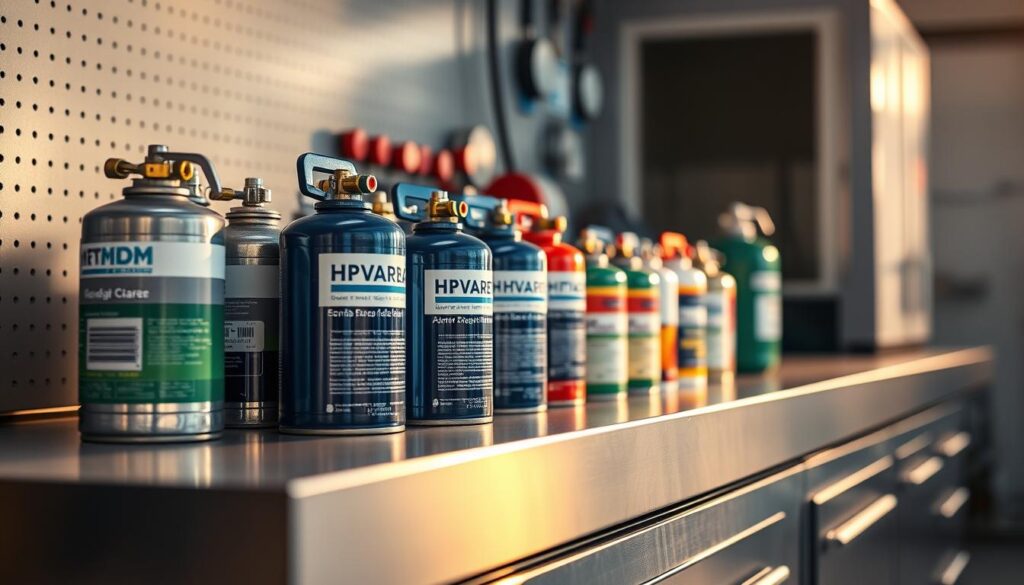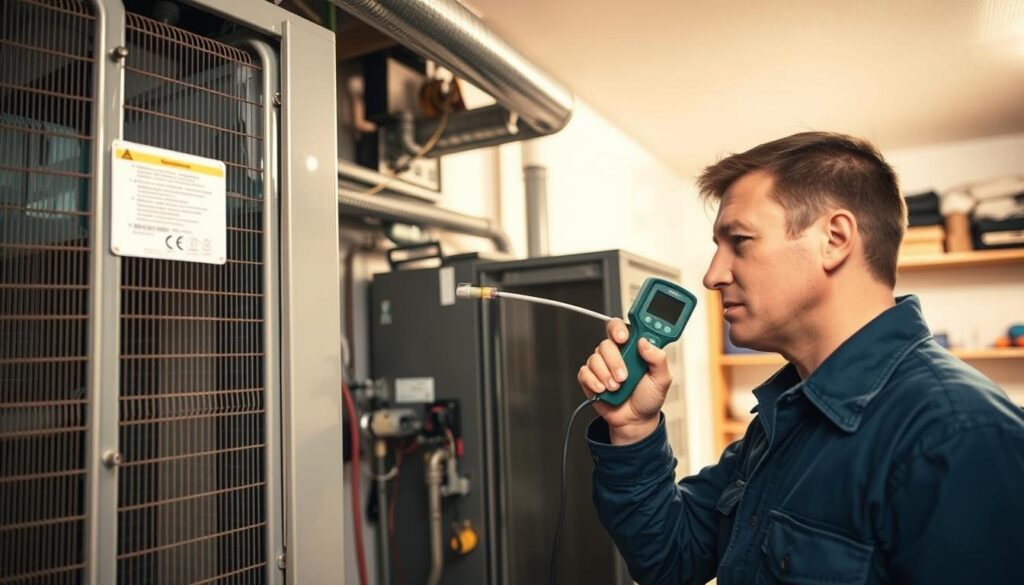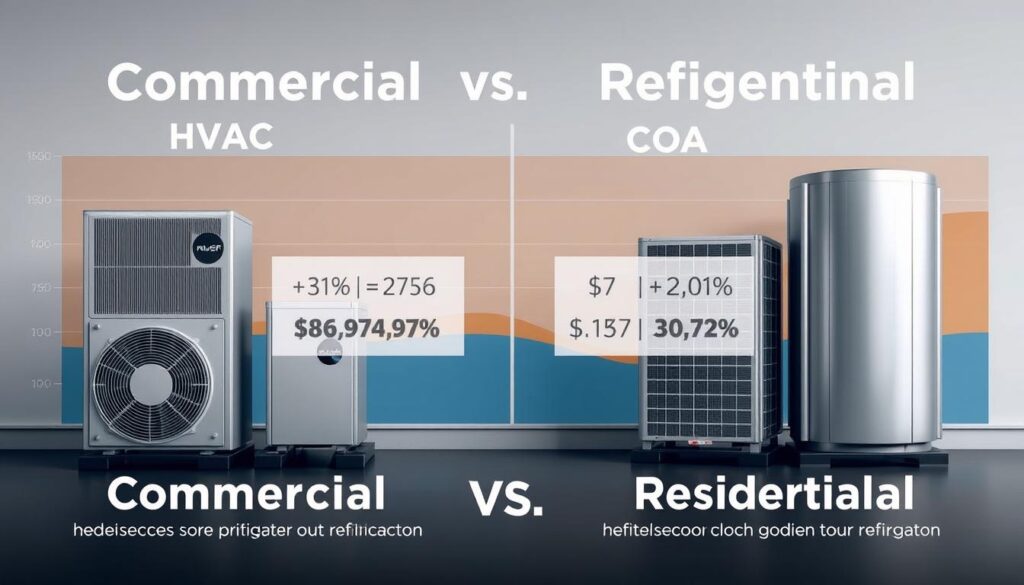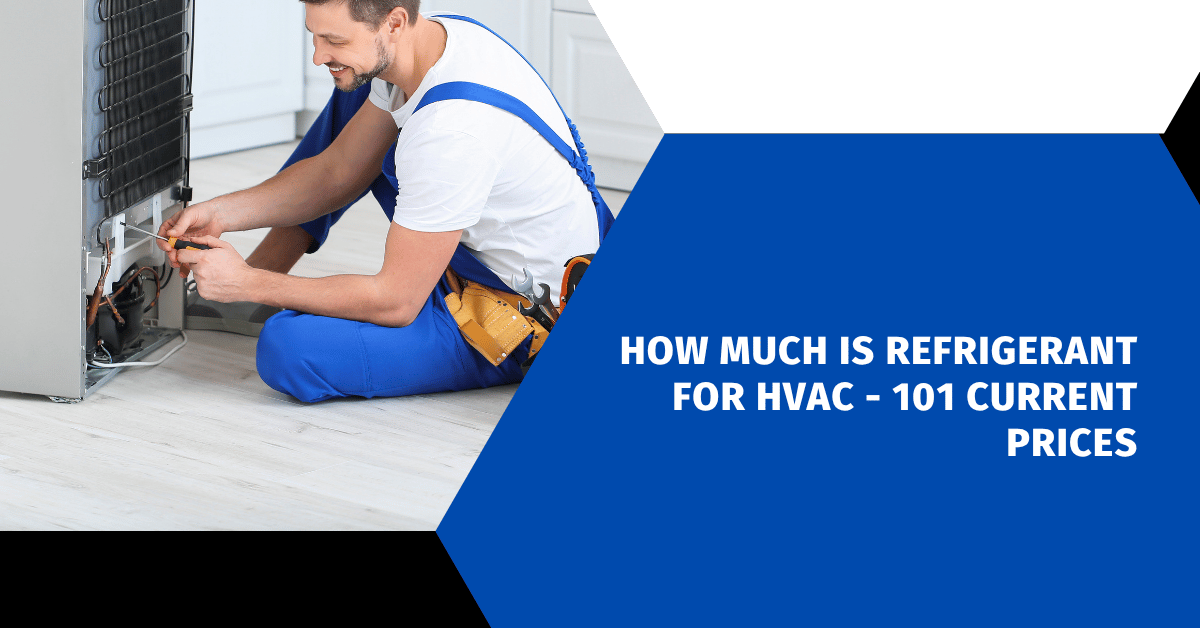Affiliate Disclosure
HVAC Guide Guys is a participant in the Amazon Services LLC Associates Program, an affiliate advertising program designed to provide a means for sites to earn advertising fees by advertising and linking to Amazon.
How Much Is Refrigerant for HVAC? Feeling surprised by HVAC refrigerant costs? Knowing the cost can save you a lot on maintenance and replacements.

HVAC refrigerant prices change due to many factors. These include the type of refrigerant, system needs, and market trends. Homeowners and managers must keep up with these changes to make good choices for their cooling systems.
Today’s HVAC systems use special refrigerants. These affect how well they work, their energy use, and if they’re good for the environment. Knowing the current prices helps you plan for repairs or upgrades.
Key Takeaways
- Refrigerant costs range from $50 to $150 per pound
- Prices vary by refrigerant type and system requirements
- Environmental regulations significantly impact refrigerant pricing
- Professional assessment is key for accurate cost estimates
- Different HVAC systems need specific refrigerant types
Table of Contents
Understanding HVAC Refrigerant Basics
Keeping your home cool depends on refrigerant. It’s the heart of air conditioning, moving heat to keep your space comfy. Knowing about refrigerant helps you save on ac refrigerant refill costs.
Today’s air conditioners use special chemicals. These chemicals change state to move heat from inside to outside. The cost of refrigerant for ac units changes based on the type used.
Types of Common Refrigerants
- R22 (Freon): Phased out in 2020 due to environmental concerns
- R410A: Current standard for new AC systems
- R32: Emerging eco-friendly refrigerant with lower global warming impact
Role of Refrigerant in HVAC Systems
Your AC system uses refrigerant in a closed loop. It absorbs heat from inside and moves it outside. This makes your home cooler. Without the right refrigerant, your AC can’t cool your home properly.
Environmental Regulations and Restrictions
The HVAC world is changing due to green rules. The EPA has set strict rules to protect the ozone layer and fight global warming. These rules affect refrigerant use.
By 2024, many current refrigerants will be phased out, pushing manufacturers toward more environmentally friendly alternatives.
Learning about refrigerant basics helps you make smart choices for your HVAC. It also helps you manage ac refrigerant refill costs better.
Current Market Prices for Different Refrigerant Types
Knowing the cost of refrigerant recharge is key for homeowners and HVAC experts. The price to replace hvac freon varies a lot. This depends on the refrigerant type your system needs.
Refrigerant types have different prices. Here’s a look at today’s market prices:
- R410A Refrigerant:
- Wholesale price: $4-$8 per pound
- Installed price: $50-$80 per pound
- R22 Refrigerant:
- Wholesale price: $13-$21 per pound
- Installed price: $90-$150 per pound
When looking at refrigerant recharge costs, consider a few things. The age of your HVAC system and its refrigerant needs matter. So does current environmental rules.
Refrigerant pricing isn’t just about the material cost. It also includes labor, system complexity, and environmental fees.
New refrigerant options are coming out. These might cost more upfront but save money and the environment in the long run.
Explore Our HVAC Shop
Looking for top-rated HVAC tools, parts, and accessories? Visit our shop and find the perfect solution for your needs.
Visit the ShopHow Much Is Refrigerant for HVAC by System Type
Understanding the cost of refrigerant for different HVAC systems helps with budgeting. It also aids in making smart choices for cooling your home. The cost varies a lot based on the system type you have.
Every HVAC system needs a specific amount of refrigerant. This affects how much you’ll pay for a recharge. Let’s look at the costs for different cooling systems:
Central Air Conditioning Systems
Central air conditioning units usually cost between $200 and $500 for a refrigerant recharge. The price depends on:
- System size
- Type of refrigerant used
- Complexity of the recharge process
- Local labor rates
Heat Pump Systems
Heat pump refrigerant refill prices are similar to central AC, around $250 to $600. These systems need more specialized service because they heat and cool.
Mini-Split Units
Mini-split systems are more affordable, with recharges from $100 to $300. Their small size and simple design make maintenance cheaper.
Pro tip: Regular maintenance can help prevent costly refrigerant leaks and extend the life of your HVAC system.
Knowing the possible costs for your system helps with planning and budgeting for HVAC maintenance.
Cost Factors Affecting Refrigerant Recharge
Knowing what affects hvac system refrigerant expenses helps with budgeting. The cost of refrigerant recharge varies due to several factors.
Several key factors determine the overall commercial hvac refrigerant costs:
- Refrigerant Type: Different refrigerants come with varying price points
- System Size and Complexity
- Leak Severity and Repair Needs
- Regional Labor Rates
- Age of HVAC Equipment
The cost for a refrigerant recharge can vary a lot. For homes, it might cost between $300 and $1,200. This depends on the situation.
| Factor | Impact on Cost |
|---|---|
| Refrigerant Type | $50 – $200 per pound |
| System Size | Small: $200-$400 Large: $600-$1,200 |
| Leak Repair | $150 – $600 additional |
Commercial hvac refrigerant costs are higher. This is because of bigger systems and more complex equipment. Getting a professional assessment is key to knowing your exact costs.
Pro Tip: Regular maintenance can help prevent costly refrigerant leaks and reduce overall hvac system refrigerant expenses.
Explore Our HVAC Shop
Looking for top-rated HVAC tools, parts, and accessories? Visit our shop and find the perfect solution for your needs.
Visit the ShopProfessional Installation and Service Pricing
Knowing the costs of HVAC refrigerant services helps you plan your budget. Professional services have several pricing factors that affect your ac refrigerant refill cost.
When you need professional refrigerant service, you’ll face different fees. These costs change based on your location, service complexity, and HVAC system needs.
Standard Service Call Rates
Standard HVAC service calls can range from simple maintenance to complex refrigerant issues. Technicians usually charge:
- Standard service call fee: $75 – $200
- Hourly labor rates: $50 – $150 per hour
- Basic maintenance visits: Often lower-cost options
Diagnostic Fee Structure
Diagnostic fees are key for finding specific refrigerant and HVAC system problems. These fees usually include:
- Initial system inspection
- Refrigerant pressure testing
- Leak detection
- Comprehensive system evaluation
| Service Type | Typical Cost Range | Included Services |
|---|---|---|
| Standard Diagnostic | $75 – $200 | System inspection, basic troubleshooting |
| Comprehensive Evaluation | $150 – $300 | Detailed system analysis, refrigerant assessment |
Emergency Service Costs
Emergency HVAC services cost more. Expect to pay a premium for after-hours or immediate refrigerant-related repairs. Emergency services can raise your total ac refrigerant refill cost by 50-100%.
Always ask your HVAC professional about fees and get a detailed estimate. This helps avoid unexpected costs.
Refrigerant Leak Detection and Repair Costs

Finding and fixing refrigerant leaks in your HVAC system is key. It keeps your system running well and stops expensive damage. If you don’t catch leaks early, the cost can go up fast. So, finding leaks quickly is a smart move for homeowners.
Getting a professional to find leaks costs between $130 and $300. They use special tools and know-how to find where the leaks are. There are a few ways to find these leaks:
- Electronic leak detectors
- Ultraviolet dye tests
- Pressure testing
- Visual inspection
The cost to replace freon in your HVAC system depends on the leak’s size and where it is. Repair costs can be from $200 to $1,500. Several things affect the price:
| Leak Location | Typical Repair Cost | Complexity |
|---|---|---|
| Evaporator Coil | $600 – $1,200 | High |
| Condenser Coil | $400 – $900 | Medium |
| Refrigerant Lines | $200 – $500 | Low |
Even small leaks can hurt your system’s performance. Not fixing refrigerant leaks can raise your energy bills and even break your compressor. Keeping up with maintenance and fixing leaks fast can save you money over time.
Always choose certified HVAC experts for leak detection and repair. They can fix leaks right and make sure your system works well. They also help protect the environment.
Comparing R22 vs R410A Costs and Benefits
When looking at HVAC refrigerant costs, knowing the difference between R22 and R410A is key. These refrigerants are from different cooling technology generations. Each has its own traits that affect the cost of air conditioner refrigerant refills.
The world of refrigerants has changed a lot in recent years. R22, once common, is being phased out for environmental reasons. This change affects the cost of refrigerant refills and how we maintain HVAC systems.
Long-term Cost Analysis
Looking at long-term costs, R22 and R410A show big differences:
- R22 prices have skyrocketed because it’s hard to find
- R410A has more stable prices and is easier to get
- Systems using newer refrigerants can save money in the long run
Environmental Impact Considerations
Environmental rules have changed how we choose refrigerants. R22 harms the ozone layer, while R410A is better for the environment. New refrigerants like R32 and R454B are even greener.
System Efficiency Differences
Efficiency is important when picking a refrigerant. R410A usually uses less energy than R22, which can lower your HVAC costs. New refrigerants keep getting better, giving homeowners advanced cooling options.
Explore Our HVAC Shop
Looking for top-rated HVAC tools, parts, and accessories? Visit our shop and find the perfect solution for your needs.
Visit the ShopCommercial vs Residential Refrigerant Pricing

Knowing the difference between residential and commercial refrigerant costs is key. This knowledge helps you make smart choices about your cooling system. The prices for residential and commercial HVAC systems are quite different.
Residential and commercial cooling systems have unique features. This affects refrigerant prices. Homeowners usually have smaller systems, while businesses need more complex refrigerants.
- Residential systems usually require 2-5 pounds of refrigerant
- Commercial HVAC systems may need 10-50 pounds per recharge
- Specialized commercial refrigerants cost more per pound
Several factors influence your refrigerant costs:
| Factor | Residential Impact | Commercial Impact |
|---|---|---|
| Refrigerant Volume | Low (2-5 lbs) | High (10-50 lbs) |
| Average Cost per Pound | $50-$100 | $100-$300 |
| System Complexity | Simple | Advanced |
Commercial hvac refrigerant costs are usually higher. This is because commercial systems are larger and use more specialized refrigerants. Businesses spend more on their cooling systems, leading to higher refrigerant costs.
Pro tip: Always talk to a professional HVAC technician. They can give you accurate prices for your residential or commercial refrigerant needs.
Conclusion
Knowing the cost of refrigerant for HVAC systems is key for homeowners and property managers. The average cost for an AC refrigerant refill is about $400. But, your exact cost depends on several factors like the system type, refrigerant choice, and repair needs.
Regular maintenance is vital to keep refrigerant costs down. By getting professional inspections and fixing leaks early, you avoid expensive repairs. This also makes your HVAC system last longer. Experts can guide you on when to replace refrigerant and improve system efficiency.
Managing refrigerant should balance cost with environmental care. Different refrigerants cost differently and affect the environment differently. Knowing current rules and picking the right refrigerant can save money and keep your system working well.
Preventative maintenance, knowing your HVAC system’s needs, and hiring certified pros are key. A proactive approach ensures your cooling systems work well and keeps refrigerant costs in check.

